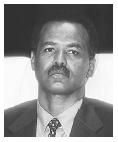ERITREA
Isaias Afwerki
President

(pronounced "uh-ZAY-us aff-WER-kee")
"Men make history, and we have made an independent Eritrea."
The State of Eritrea, a former province of Ethiopia, voted its own independence from that country in April 1993 in a United Nations (UN) sponsored election. That election ended 30 years of civil war in the new nation, which borders on the Red Sea in the east, the Sudan in the west and north, and Ethiopia and the Red Sea in the south. Eritrea covers an area of 121,320 sq km (46,842 sq mi) and has a population estimated at 4,465,651 in 2002. Eritrea's land varies dramatically between highlands above 2,134 m (7,000 ft) and its surrounding lowlands, which descend to sea level on the Red Sea coast in the east and the arid Sudan border in the west and north. Between the capital city, Asmara, and the Red Sea port at Massawa, the road descends 2,286 m (7,500 ft) in only 80 km (50 mi). Eritrea's climate, especially its rainfall, is erratic. Because Eritrea lies in the easternmost part of the African Sahel, it frequently has been vulnerable to drought. Eritrea has few natural resources, though deposits of salt in its eastern lowlands have long been an important product for both animal and human consumption in the region. Its river valleys flowing west to the Nile River basin are potential resources for irrigation agriculture.
Eritrea is a rich blend of cultures, religions, and languages. About half of its population is Ethiopian Orthodox Christians, and about half are Muslim. The dominant language is Tigrinya, a Semitic language. Other important languages include Afar, Amharic, Tigre, and Arabic. Most highlanders are farmers, while many lowlanders continue to be nomadic herders of camels and goats. Residents of towns generally are merchants or civil servants.
The effects of the civil war and major famines caused by drought have shattered much of Eritrea's economy. Roads, factories, and water and irrigation systems have been damaged or destroyed. Per capita gross domestic product (GDP) of Eritrea is US $740 (2001 estimate), making it one of the poorest countries in Africa. The unit of currency is the birr .
ADDRESS
Office of the President
Asmara, Eritrea
Comment about this article, ask questions, or add new information about this topic: